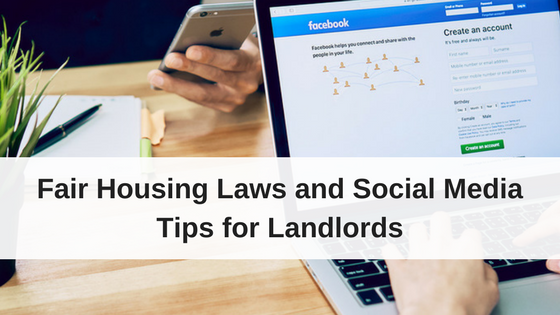
When marketing a vacant rental, landlords and property managers can turn to several options to promote their rental vacancy ad. Everything from a for rent sign to positing to the most popular rental listing sites can help you find the most qualified tenant for your property.
Gaining in popularity is the use of social channels to promote a property or vacancy. Apartment complexes and property management companies even have their own social media accounts on Facebook, Twitter and Instagram. Here’s a look at one apartment complex’s Facebook page, which may or may not be the place I lived for two-years during college.
Creating these social media accounts is a great way to stay connected with your residents, promote events, encourage community bonding, and market your rental properties.
While using social media is a great way to connect with your current and future tenants, you need to remember that, as an extension of your company, your social media pages must comply with all landlord-tenant laws.
One of the most important housing laws landlords and managers need to remember when using social media for your rental business, is to comply with Federal Fair Housing Laws.
This means that anytime you talk about your property, whether on the property’s page or your personal social media account, you need to avoid discriminating against a protected class.
Federal Fair Housing Laws
The Federal Fair Housing Act prohibits housing providers from discriminating against a protect class. Protected classes include: race, color, religion, sex, familial status, handicap, and national origin.
Please note, that while there is no federal law protecting sexual orientation or gender identity, several states have created laws that do protect these classes from housing discrimination. Check this map for more information.
Landlords and property managers can be accused of accidental (and unintentional) discrimination against some protected classes by the language they use to promote a property on social media.
For example, it is illegal to say you have a single-family rental property available that would be perfect for families since it is near a great school. By using the language “perfect for families” you are essentially saying that the property is better suited for a renter based on their familial status which is a protected class.
Any rental ad, or social media post, must comply with federal fair housing laws.
Unintentional or Accidental Discrimination
Even if you have no intention of preferring one renter over the other, you can still get accused of housing discrimination. Unintentional discrimination is referred to as disparate impact.
Back in 2015, the Supreme Court provided further clarification on anti-discrimination laws regarding disparate impact for the Fair Housing Act. The June 2015 ruling, saw a 5-4 decision that an action can be considered discriminatory even if the intent was not.
Fair Housing and Social Media
In order to help you stay compliant with Federal Fair Housing Laws on your social media accounts, Grace Hill provides the following guidance:
5 Tips to Ensure Social Media Complies with Fair Housing Laws
Train everyone in fair housing. Before being given access to your social media accounts, each person should complete fair housing training and acknowledge your company’s policies and procedures. Do the same for any agency or service that has access to your social media.
Show diversity in images. Consider all federal, state, and locally protected classes. For example, show males and females, people of different races, people with disabilities, a variety of ages, and families with and without children. Show diversity when using avatars, animated characters, and illustrations, too.
Use welcoming language. Social media messages must not position your community as more or less suitable for someone based on membership in a protected class. Avoid things like racial or ethnic terms, references to religion, exclusions based on disability, and limitations based on familial status. A good rule of thumb is to describe the community, not the people.
Designate a point person to regularly review all social media posts. Reviews should look for words or images that discriminate, limit or deny equal access to your community based on membership in any federally, state or locally protected class. Also look for posts in which prospective or current residents indicate they feel they’ve been treated unfairly, don’t feel welcome in your community, feel they are being discouraged from living in your community.
Display the Equal Housing Opportunity Logo. Always show the Equal Housing Opportunity slogan, logo or statement on your social media pages and on your website
These tips were originally published by Grace Hill. For nearly two decades, Grace Hill has been developing best-in-class online training courseware and administration solely for the Property Management Industry.
Fair Housing laws apply to all housing providers, including property managers and their representatives, private landlords, and real estate investors. Failure to comply with Fair Housing laws can result in legal action taken against you. Being uninformed of the housing laws that apply to you and your property is not acceptable.
Using social media to promote your rental vacancies is a great, and free way to find qualified tenants and stay connected with your residents. Just make sure to always comply with Federal Fair Housing laws and any other local or state laws that pertain to your property.
Related Reading For You:
- 3 Reasons Property Managers and Landlords Should Use Facebook
- Would a Felony Charge Automatically Disqualify a Prospective Tenant?
- What’s Up with Those “55+” Rental Ads






CAN YOUR LANDLORD GIVE YOU A 90 DAY MOVE NOTICE BECAUSE HE HAS DECIDED TO SELL THE PROPERTY WHEN WE JUST LEGALLY HAVE A LEASE. STARTING ,03/01/22 TO 03/01/22.
Hi Sheila, it does sound like odd timing. This article might have some useful information | Renter’s Rights When Your Landlord Sells Your Rental Home
And I would recommend you contact your local housing authority and ask about the laws in your state when a landlord sells as they would have the most current information related to your area regulations.
Can a landlord charge a person 430.00 for rent and charge others 600.00 for rent and the lower person is her friend and others are not her friends so is this legal in any way?